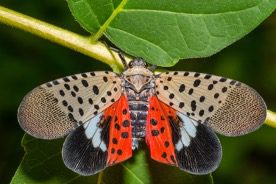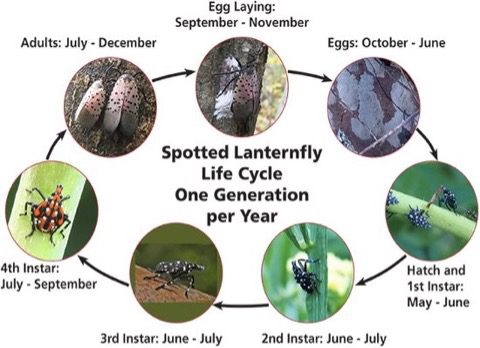Spotted Lanternfly Control in Greensburg and Johnstown, PA

We’re here to keep your outdoor adventures in Western Pennsylvania bug-free and full of fun. Our pest control services aren’t just about mosquito, tick, and flea treatments. We’re also your go-to experts for top-notch spotted lanternfly control services in Cambria, Indiana, Somerset, and Westmoreland County.
Background on these bugs
The spotted lanternfly is a quirky little planthopper. It hails all the way from China, India, and Vietnam—now that’s a well-traveled bug. In 2014, it made its grand appearance in America, in fact right here in Pennsylvania. It has been wreaking havoc on property owners here ever since.
Physically, spotted lanternflies boast a unique transformation. At rest, they appear subdued, with a gray color adorned by little black spots. But when they take flight, a true spectacle of nature’s design unfolds.
When they open their wings, you’ll see a striking mix of red and black. Their abdomen displays a captivating blend of yellow and black.

The spotted lanternfly takes less than a year to go from egg to full adult.
- Eggs hatch: Spotted lanternfly eggs resemble smeared masses of mud. These eggs begin to hatch in May all the way through June.
- Nymphs: The are four different nymph stages, which take place from June to July.
- Adults: In adulthood, they will start searching for mates. This occurs anytime from June to December.
- Laying eggs: They mainly lay eggs at the end of the summer, but this can happen through December.
Remember, adult spotted lanternflies don’t survive through the winter. That’s why it’s crucial to eliminate the eggs whenever you find them.
Negative Impact
These troublemakers are certainly unwelcome guests in Greensburg-Johnstown’s outdoor havens. From snacking on valuable trees and plants to leaving sticky messes behind, they can be quite a nuisance.
They have an appetite for various local flora. They’ll snack on fruit trees, grape vines, and hardwoods, posing a threat to our beautiful surroundings. Their feeding weakens plants and trees, potentially causing lasting harm to the local ecosystem.
That’s not all – spotted lanternflies also secrete a sticky substance called honeydew as they dine. The honeydew they produce becomes a breeding ground for mold. The mold is not only harmful to the plants but draws in more unwanted insects like ants and wasps.
At Mosquito Joe of Greensburg-Johnstown, we’re here to put an end to this invasion. Our early-stage treatment for spotted lanternflies ensures that you can enjoy the outdoors without the hassle of these unwanted bugs. Say goodbye to nuisances and hello to worry-free outdoor joy!
Spotted Lanternfly Control near me
At Mosquito Joe of Greensburg-Johnstown, we use customized strategies to match the unique demands of your property. With our expertly trained service professionals, we’ll visit your property, pinpoint problem areas, and apply effective treatments.
Our method not only removes the current infestation but also sets up protection against future spread to nearby plants and trees.
Don’t give in to these garden gluttons. If you’re grappling with a spotted lanternfly problem in Western Pennsylvania, give us a call. You can request a free quote, and together we’ll make outside fun again.
FAQs about Spotted Lanternflies
What month are spotted lanternflies most active?
Spotted lanternflies will be most active in the adult stage of their life cycle, which is typically July-December. It’s very important to have a handle on them by this point in the year. Reach out to Mosquito Joe of Greensburg-Johnstown for help.
What happens if a lanternfly bites you?
They’re not harmful to humans, thankfully. They do not sting or bite. They are, however, very destructive to many trees, plants, and crops in Greensburg and Johnstown, PA.


